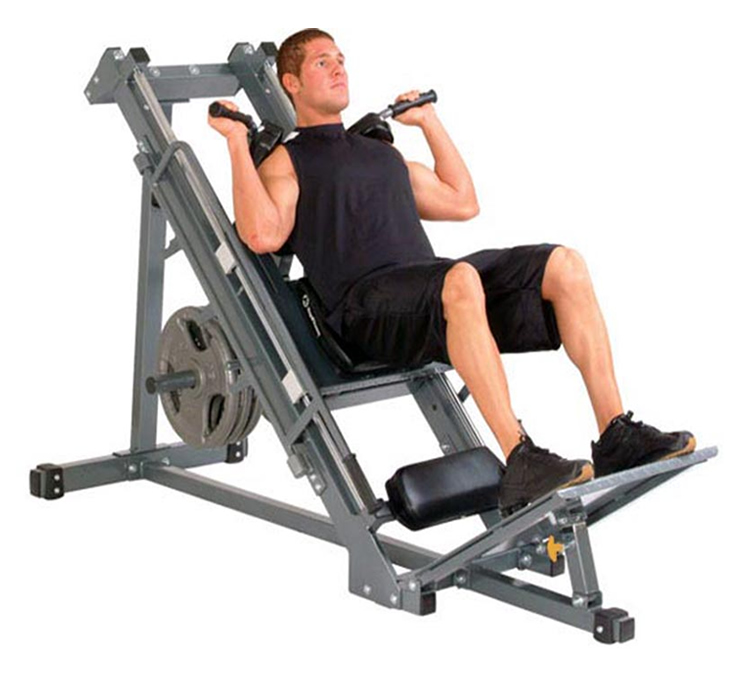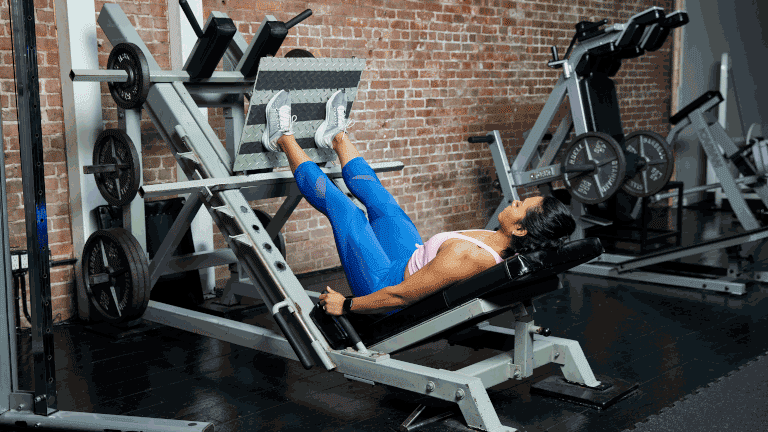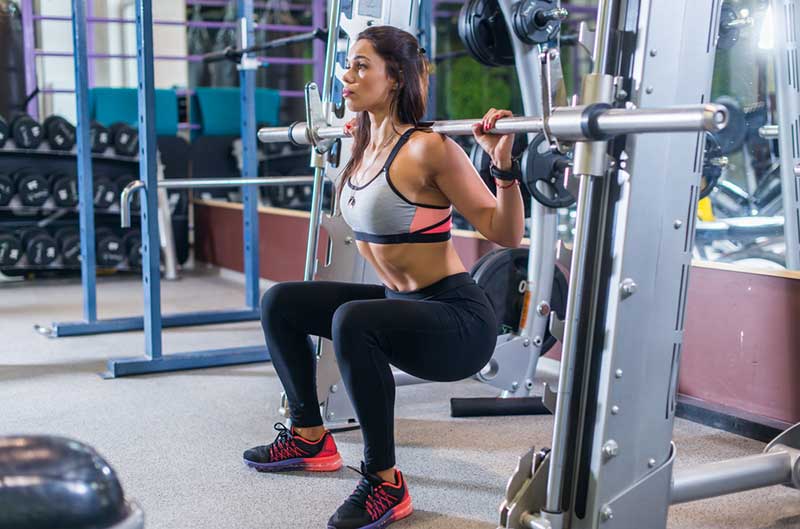Here are four great machines to build up your quads!
Every muscle can be built with free weights or machines, but quads in particular benefit greatly from machines. You show me somebody who’s built tree trunk quads and I’ll show you somebody who takes machine training seriously.
Oddly enough though, gym culture demonizes machines. They’d rather die on the barbell hill than grind their quads through a machine. They’ll say things like, “Machines aren’t as manly” or “Machines aren’t functional.” Oh so much stupid.
Machines rock and if tired of having baby quads, strap into the following machines.

1 – Hack Squat
The hack squat is an epic machine because it’s design fits everybody’s structure. It’s angled for a reason.
With traditional barbell back squats, the bar rests on your back and you’re essentially resisting weighted gravity. This means the bar has to stay over your center of mass or else you would topple over on either side and turn into a viral gym fail.
For the weight to stay over the center of your mid foot, your joints bend at specific ratios based on your anatomy. For some people, this means they genetically get more of an upright position which means more knee flexion(knee bend) hence more quad growth.
However, some people with less favorable limb ratios could be lifting the same load for the same amount of reps may not get as much quad growth because their anatomy limits knee flexion.
Fortunately, the hack squat solves this. The machine prevents you from toppling over and puts you at angle to get lots of knee flexion. It’s also suggested you bring your stance slightly lower and more inwards if it produces more knee flexion. This isn’t always the case, but for most people, the hack squat is better quad builder than barbell back squats.
To best perform the hack squat, follow the following cues:
- Push through your entire foot.
- Allow your knee to travel forward.
- Keep your back neutral against the pad with no posterior pelvic tilt.
- Grip the handles tight for stability.
I also like to have a reverse band set up on hack squats to add more resistance to the top portion of the lift. I find this more joint friendly and allows the entire rep to be more challenging as opposed to just the bottom portion being overloaded.

2 – Leg Press
The leg press is a bodybuilding stable and for good reason, but many dorks abuse it to stroke their ego. Nearly everyone who does it slaps on too much weight and perform a micro range of motion about the size of their puny brain. You thought I was going to say something else huh?
Well anyways, the leg press is a quad stimulating fast track if you used correctly. Here’s how to maximize quad growth on the leg press.
Set up
First set the seat as far back as you can. This minimizes hip flexion and the stretch on your glutes. This also increases your range of motion and allows for more knee flexion. Less hip flexion and more knee flexion means more quads and less glutes which is what you want.
To be clear, the glutes will still be working, but they’re not the priority in this case.
Keep your back pressed against the pad and similar to the hack squat, don’t allow for any posterior pelvic tilt. This takes tension off the targeted muscles and while it’s not a super dangerous position, does place more stress on the joints.
As for feet position, your most comfortable position should be fine. Do consider going slightly narrower and lower for more quads, but only if it doesn’t sacrifice range of motion.
Warm Up
The leg press is a heavily loaded exercise, so doing at least a couple warm up sets would be wise. This also allows you find your groove and adjust your feet position if needed. Perform all warm up sets just as you would your working sets.
This means with a controlled eccentric, a forceful concentric, and a full range of motion especially in the bottom position where the muscles are stretched and procuring lots of muscle building mechanical tension.
As you add load to your warm up sets, range of motion must not be compromised. If range of motion is cut short, you’ve gone too heavy.
Working Sets
Before you start your working sets, you can add bands for accommodating resistance. If not, no worries. Rest fully before starting your first working set.
Brace every rep and push until you reach near failure. Rest at least 3 minutes between sets. If you think you can go with less rest, you didn’t push hard enough.
By set 3, you should feel like walking is challenging. It’s ok, your quads will thank you later.
And remember, the leg press is a fixed plane. There’s no cheating technique besides range of motion. Either your quads get stronger or they don’t.

3 – Smith Machine
If the leg press or hack squat is taken, you can rely on the smith machine for some sweet quad gains. Yes, the most taboo machine is a hypertrophic beast.
“But it’s a fixed bar path.”
Yes, you dork, that’s the point. That’s where all the benefits come from. Similar to a hack squat, the design of the smith machine allows you to achieve more knee flexion through a fuller range of motion.
“But it deactivates your stabilizers.”
Again, people are dense. That’s what makes the smith machine so valuable. Without your core having to stabilize, you can push your quads much harder. You’re not limited by core or stability requirements not to mention it’s less taxing on your joints and nervous system.
In other words, more muscle building stimulus for less fatigue cost. A win, win.
The smith machine also possesses the same position as the bottom of the lunge except for both legs. So it’s perfectly functional. Haters need to stop hating.
For a smith machine squat, you can stand right under the bar or have your feet slightly in forward for slightly more knee flexion. If it is an angled smith machine, make sure you face the smith machine in the direction as the bar downwards towards where you’re facing.
To execute each rep, lower your self smoothly as the bar slides down with control. Sit as upright as you can and push your knees forward. Sink into the squat as deeply as you can without any part of your back rounding or your hips tucking under.
Your quads should stretch quite nicely at the bottom reach past 90 degrees. Because of the fixed bar path and low stability demands, training close to or all the way up to failure will ensure your quads fatigued all it’s muscle fibers.

4 – Leg Extensions
The leg extension is the unicorn of machines. It’s so unique people don’t even realize it. Every machine I’ve mentioned so far is great, but they’re all similar to one on another along with free weight exercise in the muscle length it trains.
All squat or compound quad movements train the quads in the lengthened position. To maximize hypertrophy, you need to train at all muscle lengths. Leg extensions are the only exercise that trains the quads in the shortened position. In addition, it’s one of the few movement patterns that hits the front of the quads (rectus femoris) well.
The rectus femoris is tricker to train than the other quadricep muscles because it crosses both the hip and knee joint. Any squat or lunge movement doesn’t place much mechanical tension on it.
Furthermore, leg extensions are highly low fatiguing compared to compound leg movements. You can do more volume and train it within a high frequency program without worrying about recovery issues.
It also allows you to train to failure without risk of injury and use set extending techniques nicely like myo-reps or rest pause.
To set up, set the seat back as far as you can to stretch the quads the most which increases force production. Don’t set it too far back where you lose stability though.
Set the pad above ankle level. Strap on a seat belt if your leg extension has one and grip the handles tightly. Your forearms should squeeze quite hard and pull yourself into the seat. This keeps your body stable, so the quads can get smooth force output.
Kick up forcefully while maintaining stability. Pause for 1 full second with your knees locked out and lower with lots of control even as you get towards that bottom portion where the resistance drops off.
You never want to slam your leg down as your muscles won’t be producing tension in the stretched position which is crucial to growing the rectus femoris.
Learn to Train Hard With Machines
Machines provide lots of advantages from biomechanics, stability, force output, and allowing you to train your quads optimally. In fact, it’s quite hard to grow your quads quickly and naturally without machines.
These machines simply have far too many advantages to expand your thighs. So I would think twice before you yap on about machines being lame.
In fact, machines allow the targeted muscle to reach close proximities to failure. They’ll burn like all hell. Are you man enough to endure it? If so, your quads will grow.
